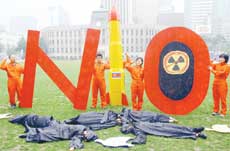SEOUL, 12 October 2006 — A defiant North Korea warned yesterday that it would regard harsh sanctions over its nuclear test as a declaration of war and threatened further trials if the United States kept up its pressure.
But US President George W. Bush stood firm, warning that Pyongyang would face “serious repercussions” over its claim to have carried out a nuclear explosion.
As the UN Security Council weighed what action to take against the regime, Pyongyang’s No. 2 and its Foreign Ministry warned of “physical” measures if it was hit with the kind of sanctions proposed by Washington and Japan.
Hours later Bush told a press conference in the White House Rose Garden: “We are working with partners in the region and in the United Nations Security Council to ensure there are serious repercussions for the regime in Pyongyang.” The rhetoric underscored the standoff between the international community and the secretive nation, which sent shockwaves around the world Monday after announcing it had successfully tested an atom bomb for the first time.
The chance of sanctions grew after even the North’s main ally China said it would support punitive action.
“If the US continues to harass and put pressure on us, we will regard this as a declaration of war and will take a series of physical countermeasures,” said a Foreign Ministry statement carried by the North’s official Korean Central News Agency.
It did not elaborate on the measures, but insisted it was still ready for talks to improve security and stability on the Korean Peninsula. “We are ready for both dialogue and confrontation.”
Statements from the Foreign Ministry are seen as carrying more weight than comments on state media. It was the ministry which announced on Oct. 3 that Pyongyang planned a nuclear test.
The message was reinforced by Kim Yong Nam, who as head of the North Korean Supreme People’s Assembly is effectively the regime’s No. 2.
“If the United States continues to take a hostile attitude and apply pressure on us in various forms, we will have no choice but to take physical steps to deal with that,” he said in an interview with Japan’s Kyodo News.
He added: “The issue of future nuclear tests is linked to US policy toward our country.”
Japan meanwhile ramped up its bilateral sanctions on North Korea, slapping a complete ban on imports and shipping and barring almost all the communist country’s nationals.
“Considering the improving capability of North Korea’s missiles and its nuclear capability, Japan is the country that is most affected by the actions of North Korea in terms of security,” said Prime Minister Shinzo Abe.
Abe, who rose to prominence as a hard-liner on North Korea, said the world had to take action even if the scale and nature of the test could not be confirmed.
“Even if it’s a failure, that means they attempted to conduct a nuclear test,” he told Parliament. “We have to take considerable measures.”
The Security Council was to meet in New York later yesterday to weigh a draft resolution imposing a series of sanctions, including inspection of all seaborne cargo to and from North Korea as well as financial restrictions.
It was not certain if China and Russia — which both have veto power, tend to oppose international sanctions and have close ties with Pyongyang — would back such measures.
“I think there have to be some punitive actions but also these actions have to be appropriate,” China’s UN ambassador, Wang Guangya, told reporters.
Wang said China wanted a resolution that included “some elements” of the UN Charter’s Chapter VII, which legally opens the door to mandatory sanctions to face down threats to international peace and security.


